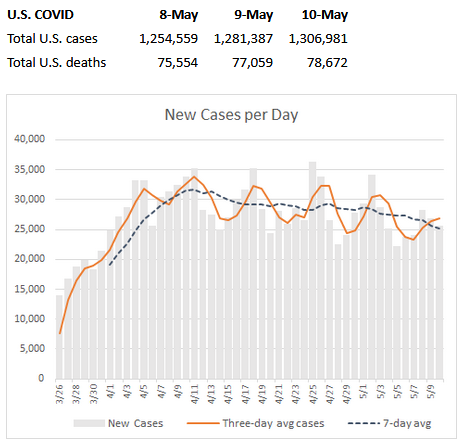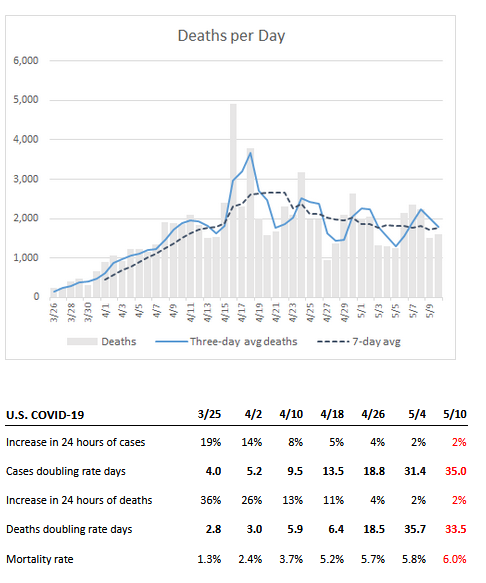Our benefactor writes:
The slow decline in cases and deaths continue, led mostly by NY and NJ. Weekend underreporting does not look too severe.
I’m going to discuss Covid-19 in a bit more detail next week. US policy is about to turn this into a real catastrophe.


The results of the work I do, like this article, are free, but food isn’t, so if you value my work, please DONATE or SUBSCRIBE.

Stirling S Newberry
Since this is a “Slowly curved down” it is going to be a slog.
Jerry Brown
US policy is going to turn this into a catastrophe? That is just nonsense. USA is number 1 in cases and deaths and appears determined to keep it that way. Um I guess some of that depends on your definition of catastrophe. Whatever you write, keep in mind that we (USA) are leading the world in those key statistics. American Exceptionalism or whatever. We are #1 and don’t forget it.
Ian Welsh
If you think this is bad, you ain’t seen nothing yet. This isn’t a catastrophe, you’ll look back on this death toll as minor.
Jerry Brown
Great.
bruce wilder
The Erin S. Bromage piece linked by Tony Wikrent and the Quillette piece by Jonathan Kay, linked by Erin Bromage, are both quite interesting exercises in observational epidemiology.
I do not think those in authority mandating social distancing have done an especially good job of explaining what practices are likely to be most risky. The failure of those in authority to grasp what matters in this context has been general and consequential, and one of the consequences is a widespread lack of confidence that any policy proposed is part of a thought-out strategy or likely to be effective.
anon
I’m just hoping that I’m young and healthy enough that if/when I get it I will survive. I am fortunate to be able to work from home but that can only last for so long. If we have another 2-3 years before a vaccine is available to everyone, there is no choice other than to go about one’s daily life and hope not to be one of the unlucky ones who will end up dead.
Stirling S Newberry
I do not know about others, but in Boston, it is a slow burn, I’ve not lost anyone who is close, but I had a few who have come down with it.
Stirling S Newberry
“Scary to go to work.” The disconnect at the White House is mind-boggling, we should feel scared but not our lords and masters. G-o-d-f-o-r-b-i-d.
someofparts
From Duncan Black last week:
“Absent an absurd turn of good luck at the Deus ex Machina level, the US could be a “no go zone” for the rest of the world soon.”
When Canada has to close your borders to protect yourselves from our plague-infested hordes, please keep this website going to remind us that civilization still exists somewhere.
Lex
I agree with Ian. This isn’t the real catastrophe yet. We’re talking about the second wave when we haven’t even gotten over the hump of the first wave anywhere but a few places. And we’re being led to believe that it’s a bell curve but anyone can see from any graph of fatalities that there’s a large plateau behind the first bump. We wasted the time given by stay at home orders that should have been used to put lots of responses in place. We’ve failed to cope with the economic impacts by addressing the collapse in demand. All the smoke detectors in the house are going off and we’re just pushing the “hush” button so we can get back to watching TV.
krake
Stirling,
It’s deep in Chelsea, Revere and Saugus. I met sick people in February. If I remember correctly, I read about a month back that Chelsea was the epicenter, and c-19 had been spreading “silently” for a month because it’s not a pop. ctr. with good health access or wages. All my work is there, which is why I’m furloughed.
Mass is losing 150 to 200 a day. If that were heroin, fentanyl or shootings, people would be rightly losing their mibds
Mark Pontin
https://twitter.com/michaelvkim/status/1258987354934538248
Michael Kim
@michaelvkim
As an American currently in South Korea, it’s very interesting to me the stark contrast of how different the two countries’ response to coronavirus is. I don’t think most Americans fully understand the lengths that South Korea has undergone, so I’ll try my best to explain.
10:09 PM · May 8, 2020·Twitter for iPad
Upon arrival, they take your temperature at the airport and ask if you’ve experienced any symptoms. If you have, they move you to a separate area and give you a coronavirus test. If you haven’t, they take you to another area and interview you. They also install ankle bracelets
You are required to install an app on your phone and enable location tracking all the time. You are required to self-report symptoms in the app twice a day. If you don’t have symptoms, you need to report that too. This goes on for a period of 14 days
During this time, you are not allowed to leave the quarantine dormitory or your home if you’ve chosen to self-isolate at home. You cannot take public transportation or taxi, and you cannot self-isolate in a hotel or Airbnb. If you don’t have a home, you must use the dorm.
If you break quarantine, you are fined $10,000 USD and face jail time. Also, they check your location on your phone frequently. My wife had her location checked 37 times in a 3 day span. And they’ve caught enterprising folks who leave their phone at home and go out.
During this self-isolation, you cannot have contact with anyone during this time. They give you special trash bags to throw away your trash in, and people in hazmat suits come and collect your trash upon request
You are assigned to a case worker who is responsible for making sure you are following all the orders. They will call you and text you to make sure you are OK. They also will send you care packages that contains a lot of food, gloves and masks, sanitary pads for women, etc.
3) If there’s a new coronavirus case in your general area (same city or district), you get a Public Safety Alert on your phone that tell you about the person (age, male/female, city) and provides updates as they receive them.
I forgot to mention that Korea also has mobilized their army to provide more operations and logistics support at the airport.
We were required to get a COVID-19 test within 3 days of arriving, which is the only activity that’s allowed to break quarantine. You have to do this in coordination with the case worker. As a family of 4, we were done testing in about 10 minutes. Test results came in 7 hours.
In response to recent public safety alerts, my family changed our plans for the next several weeks to avoid certain areas. Places with lots of traffic like Korea’s version of Walmart have temperature monitors installed so you can see everyone’s tempe
There’s absolutely no protests or demonstrations about the anti-freedom measures or invasion of privacy. I’m not an expert in Korean politics but it seems like everyone accepts these measures as required to address this pandemic.
While we still take precautions like wearing masks in public, washing hands frequently, using hand sanitizer, etc., I feel pretty confident that the government knows everyone who has coronavirus and is tracking things very closely, which means I don’t have to worry as much.
And like some of the articles have mentioned, if you’ve been to a place where someone who has coronavirus has also visited, someone will contact you to get tested and undergo self-isolation for another 14-day period.
Contrast that with the situation in the US… no one really knows everyone who has coronavirus, so you have to assume that everyone has it. And there’s really no actionable plan to address that particular issue.
Not trying to be political, just wanted to showcase the situation in a country that seems to have an actionable plan that has resulted in a dramatic decrease in cases and fatalities. In case people were interested.